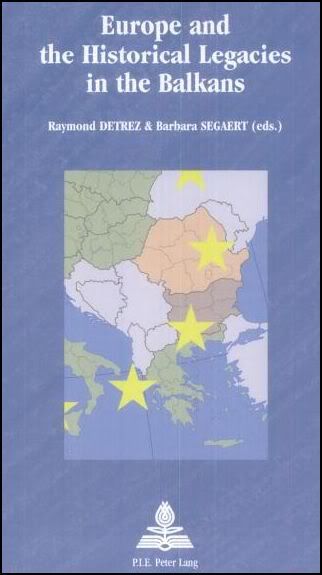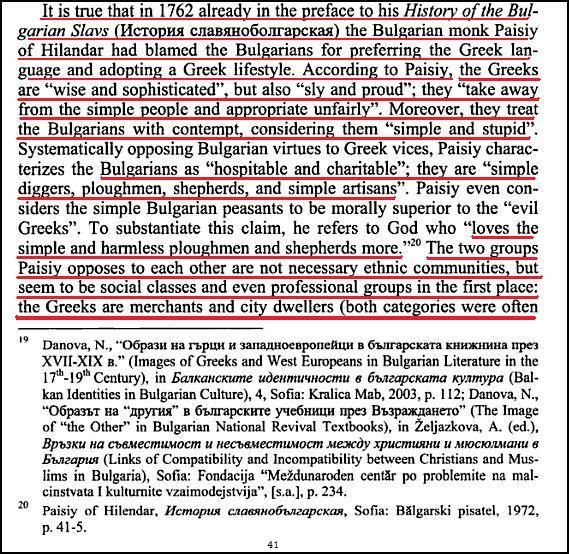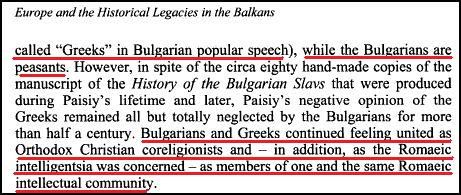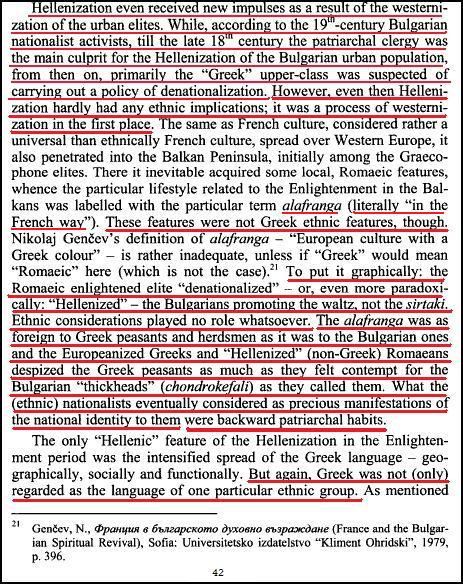Paisius of Hilendar was an 18th century monk from the Macedonian town of Bansko, which as a result of wars in the early 20th century now belongs to the modern Bulgarian state. His fame as the author of the 'Slavonic-bulgarian History' and his promotion of the 'Bulgarian' identity for the purpose of maintaining Slavonic origins in the face of Greek agression has prompted modern Bulgarians to claim Paisius of Hilendar as the father of the modern Bulgarian nation.
Here is a text from the Bulgarians' beloved Paisius of Hilendar:
As can be seen, he claims that the first kings of Bulgaria were called Vukich and Dragich, a far cry from Volkov and Dragov. It should be stressed that the works of Paisius of Hilendar contain several historical inaccuracies and inconsistencies which remain largely the creation of the author.
Saint Paisius of Hilendar or Paisiy Hilendarski (Bulgarian: Свети Паисий Хилендарски) (1722–1773) was a Bulgarian clergyman and a key Bulgarian National Revival figure. He is most famous for being the author of Istoriya Slavyanobolgarskaya, the first work of Bulgarian historiography. Most Bulgarians think of him as the forefather of the Bulgarian National Revival.[1]
Paisius was born in the Samokov eparchy of the time, probably in the town of Bansko, Macedonia.[2] He established himself in the Hilandar monastery on Mount Athos in 1745, where he was later a hieromonk and deputy-abbot. Collecting materials for two years through hard work and even visiting the lands of the Germans, he finished his Istoriya Slavyanobolgarskaya in 1762 in the Zograf Monastery. The book was the first attempt to write a complete history of Bulgaria and attempted to awake and strengthen Bulgarian national consciousnesses.[3]
The most famous part of the whole book is the very first sentence:
"Why are you ashamed to call yourself Bulgarian?"
This more or less signifies the purpose of the author who speaks about the danger of Bulgarians falling victim to the hellenization policies of the mainly Greek clergy. The book's first manual copy was done by Sophronius of Vratsa in 1765. Structurally, Istoriya Slavyanobolgarskaya consists of two introductions, several chapters that discuss various historic events, a chapter about the "Slavic teachers", the disciples of Cyril and Methodius, a chapter about the Bulgarian saints, and an epilogue. As Paisius toured Bulgaria as a mendicant friar, he brought his work, which was copied and spread among the Bulgarians. He is thought to have died on the way to Mount Athos near Ampelino (modern-day Loznitsa).
Paisius was born in the Samokov eparchy of the time, probably in the town of Bansko, Macedonia.[2] He established himself in the Hilandar monastery on Mount Athos in 1745, where he was later a hieromonk and deputy-abbot. Collecting materials for two years through hard work and even visiting the lands of the Germans, he finished his Istoriya Slavyanobolgarskaya in 1762 in the Zograf Monastery. The book was the first attempt to write a complete history of Bulgaria and attempted to awake and strengthen Bulgarian national consciousnesses.[3]
The most famous part of the whole book is the very first sentence:
"Why are you ashamed to call yourself Bulgarian?"
This more or less signifies the purpose of the author who speaks about the danger of Bulgarians falling victim to the hellenization policies of the mainly Greek clergy. The book's first manual copy was done by Sophronius of Vratsa in 1765. Structurally, Istoriya Slavyanobolgarskaya consists of two introductions, several chapters that discuss various historic events, a chapter about the "Slavic teachers", the disciples of Cyril and Methodius, a chapter about the Bulgarian saints, and an epilogue. As Paisius toured Bulgaria as a mendicant friar, he brought his work, which was copied and spread among the Bulgarians. He is thought to have died on the way to Mount Athos near Ampelino (modern-day Loznitsa).
Тук е потребно да се съберат заедно имената на българските крале и царе, колкото се намират, и кой след кого е царувал
1. Пръв крал бил Вукич. 2. Крал Драгич. Вукич и Драгич били двама родни брата. 3. Крал Борис. 4. Крал Братоя Силни. 5. Крал Свети Тривелия. 6.Крал Тербал, син на Тривелия. 7. Крал Мойсей, син на Тривелия. Имената на седемте крале се намират записани в началото.
1. Пръв крал бил Вукич. 2. Крал Драгич. Вукич и Драгич били двама родни брата. 3. Крал Борис. 4. Крал Братоя Силни. 5. Крал Свети Тривелия. 6.Крал Тербал, син на Тривелия. 7. Крал Мойсей, син на Тривелия. Имената на седемте крале се намират записани в началото.











Comment